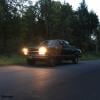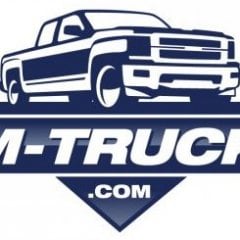-
Posts
548 -
Joined
-
Last visited
Profile Information
-
Name
Logan Lanfear
-
Location
Vermont
-
Gender
Male
-
Drives
2000 GMC Sierra
Recent Profile Visitors
5,315 profile views
Logan Lanfear's Achievements

Enthusiast (6/11)
91
Reputation
-

How Much Can I Realistically Tow
Logan Lanfear replied to jawest79's topic in 2014 - 2019 Silverado & Sierra
We tow a 7200 dry weight camper - 2011 Outback 312BH to Maine from Vermont twice a year. There are some pretty good grades on the way there but nothing compared to what you'll see in the rockies. Its only a 4 and a half hour trip but I am usually wiped and ready for a beer after it. Its stressful, even with a weight distribution hitch and sway bar. The wind is going to push you around and you will be running 50-55 on any kind of long grade. With a half ton, I would shoot for a total weight under 6500 lbs for your kind of trip. The lighter you go the better, itll be easier on you and on the truck. MPG was roughly 6 maybe 7. About a 250 mile trip and we would make it about 3/4 of the way before filling up. -

2021 AT4 HD Snow/Camper package reversion?
Logan Lanfear replied to Sheen's topic in 2020-2024 Silverado HD & Sierra HD
I run 40 in my E range tires. I am not sure what rating your tires have but I would assume its E or more. Google your specific tire and you might find a minimum rating but sidewall flex is probably the biggest thing. With 40 I dont have any 'squish' in the rear tires and just a tiny bit in the front. It was a huge improvement on the ride to go from the 60 I was running down to 40. Felt like a different truck. Just remember to air back up when you're towing or loaded heavy. -

2021 AT4 HD Snow/Camper package reversion?
Logan Lanfear replied to Sheen's topic in 2020-2024 Silverado HD & Sierra HD
Something that might be worth mentioning too is the future resale of the truck. I'm guessing that you'll get a better ride if you run your tires at 40psi instead of 80. But if you ever do go to sell the truck down the line the right thing to do would be to mention that is has the regular truck springs not the snow/camper ones. It might be worth keeping your stock ones. (I like keeping all of my stock parts if I chose to modify) Im interested in the results as most of the 2500 trucks where I live come with the plow prep. -

Duramax 3.0 L
Logan Lanfear replied to Jonathan Corriveau's topic in Future Vehicle Speculation & Spy Shots
If you're currently pulling that camper with your Suburban then props to you. Definitely not something that I would be doing. A 2500 gas will do it but the diesel will preform better in the mountains and most likely get better fuel mileage. Don't forget to factor in added fuel cost, maintenance cost and DEF. In my opinion, I would just get the gas engine to avoid these. I dont mind being a bit slow up the hills. -
Both completely depend on the size of the loader bucket and the operator. Our local guys here have a 1 yard bucket that they absolutely heap full. Customers happy cause they end up with a bit more than a yard.
-
Sounds to me like you might be leaning towards the 3.0 slightly. Price wise, I would say go for it. Considering you only really tow a couple times a year (any significant kind of trip) any power loss would not be very noticeable. Personally id recommend the 5.3 but you're against that so ill ignore it. Go for the diesel and try something new. There's no reason not to at least test drive one. Ask the dealer if they have one you can take for 24 or 48 hours. Hook your boat to it and pull it around for giggles. It may at least give you some insight on the power levels and differences between the engines.
-

Engine Missfire
Logan Lanfear replied to Buzz1's topic in 2014-2018 Silverado & Sierra Troubleshooting
Change all the plugs, after 115k its probably time. Go with OEM or something quality. If you don't know how to read plugs then post a picture of all 8 on here and we can tell you how they look. While you're there, changing the wires isn't a bad idea either. Its a good time for a tune up. If it doesn't fix the issue then you can look deeper into injectors or CPS. Its a good time to change the plugs anyway. -
Well I think technically they're all small blocks. But, correct me if I am wrong
-
As the title says, Im wondering what the smallest wheel size for my parents 2015 Yukon Denali. They currently have a set of 18" steelies that are rusting and the tires are spanked. Will 17" wheels fit? We would be looking for a set of GM wheels off of a truck or similar. Plenty of options in my area for 17's but very limited for 18's.
-
Does the truck do anything when you go to start it? Does the fuel pump kick on or do the lights flash or is it acting like its dead?
- 18 replies
-
- remote start
- battery
-
(and 2 more)
Tagged with:
-

Plowing with a 1.8 yard spreader?
Logan Lanfear replied to Able's topic in 6.6L Gas V8 & HD Transmission Powertrain (L8T/MYD)
Typically the difference between the FGAWR and the existing weight on the front axle when you have a gas engine is bigger compared to a diesel. Basically you have less weight to start with so you have more room for the plow. If anything else it means less wear and tear on the front end components. I live In Vermont and everyone around here plows. The overwhelming majority plow with a gas truck. Lower initial cost, lower cost to operate and less room for potential problems. I dont think you'll have any issues with the 6.6 gas and it'll probably cost you less in the long run. -

Beta testers wanted Save gas, Free Stuff!! lol
Logan Lanfear replied to Mr Speed's topic in 1999-2013 Silverado & Sierra 1500
"Back to city driving for the last month with numbers holding steady at 14.3L per 100km" His city driving numbers were better than before... -
Personally for me I would go for the 295 as it has the higher rating. (im guessing its also less expensive while also looking good still) 2 of the 35's gives you 6800 lbs of total tire capacity on your rear axle. With a 10,000 lb trailer, depending on how its loaded, should have between 1500 and 3000 lbs on the tongue. 2 of the 295's give you 7500 lbs of capacity on the tires. Im guessing both of the numbers are above your RGVW anyway.
-

steering rack replacement
Logan Lanfear replied to xrmik's topic in 1999-2013 Silverado & Sierra 1500
Its one of the harder DIY jobs but definitely doable as long as you take your time with the alignment parts. As long as you get it pretty close you should be able to safely drive to the alignment shop without wrecking your tires. Stuff gets dried out when it gets to be 20 years old but as long as you dont have too much rust you shouldn't have an issue.






